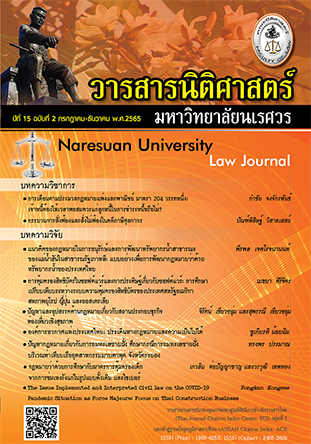Thai Space Agency: Legal Aspects and Feasibility
Main Article Content
Abstract
The Space-power states and the developing countries pay, at present, attention to the development of space activities in order to show their image, potential in space technology, and national security. In doing so, they conduct their own space activities through the “Space Agency” of the state that has powers, duties, and responsibilities on space activities, including the objectives to promote and develop space affairs; such as The National Aeronautics and Space Administration (NASA) of The United States. Although Thailand has had access to space activities for more than 40 years, this research found that Thailand’s space activities from the past to the present have had many problems, one of the problems is the lack of a National Space Agency. Therefore, if Thailand wants to potentially develop space activities, space technology, and national security, Thailand needs to accelerate the establishment of the National
Space Agency. For legal aspects and feasibility in the establishment of the Thai Space Agency, it should be studied from the establishment of the Japan Aerospace Exploration Organization (JAXA) used as a model for Thailand. The results of this research
found that the establishment of Thai Space Agency shall have characteristics as follows: (1) An independent organization which has legal entity provided by specific act, and it must under the supervision of the National Space Policy Committee in which a prime
minister is a chairman. (2) the organization is the national center which has duty on space activity in four areas which are policy maker, regulator, facilitator and operator.
Article Details
References
Boonkiat Karawekphan. “Principles of the Division of Power.” Accessed April 20, 2021. http://wiki.kpi.ac.th/. [In Thai]
CIVITAS-STL. “List of Government Space Agencies.” Accessed February 22, 2022. https://www.civitas-stl.com/civ1819/Government-space-agencies.pdf.
Kowit Phuangngam. Thai Local Government: Principles and New Dimensions in the Future. 8th ed. Bangkok: Winyuchon, 2012. [In Thai]
Major Ronald L. Spencer, Jr. “State Supervision of Space Activity.” Air Force Law Review 63, no 1. (2009): 75-128.
Meteorological Department. “Main Missions and Structures of the Meteorological Department.” Accessed March 13, 2020. https://www.tmd.go.th/aboutus/structure.php. [In Thai]
National Space Affairs Bureau. “Guidelines for the Development of Space Affairs in Thailand.” [In Thai]
National Space Policy Committee (Public Organization). “National Space Master Plan 2017-2036.” [In Thai]
OECD. Towards a Skills Strategy for Southeast Asia: Skills for Post-COVID Recovery and Growth, OECD Skills Studies. Paris: OECD Publishing.
Office of the Public Sector Development Commission. “Concept and Principles of Public Organization.” Accessed April 23, 2021. http://www.opdc.go.th/special.php?spc_id=4&content_id=296. [In Thai]
Research and Development Centre for Space and Aeronautical Science and Technology, Royal Thai Air Force. “Vision, Mission.” Accessed March 23, 2020. https://rdc.rtaf.mi.th/web/index.php/2017-02-01-01-28-28/2017-02-01-01-53-22. [In Thai]
Somkid Lertpaitoon. Law of Local Administration. Bangkok: Expernet, 2017. [In Thai]
Sompop Phurivikornaiphong. “List of Aerospace Agencies of Different Countries.” http://www.space.mict.go.th/knowledge.php?id=space_agen. [In Thai]
The National Commission for Digital Economy and Society, Ministry of Digital Economy and Society. “National Space Affairs Division.” Accessed March 13, 2020. https://www.onde.go.th/view/1/National_Space_Operations_Division/EN-US. [In Thai]


